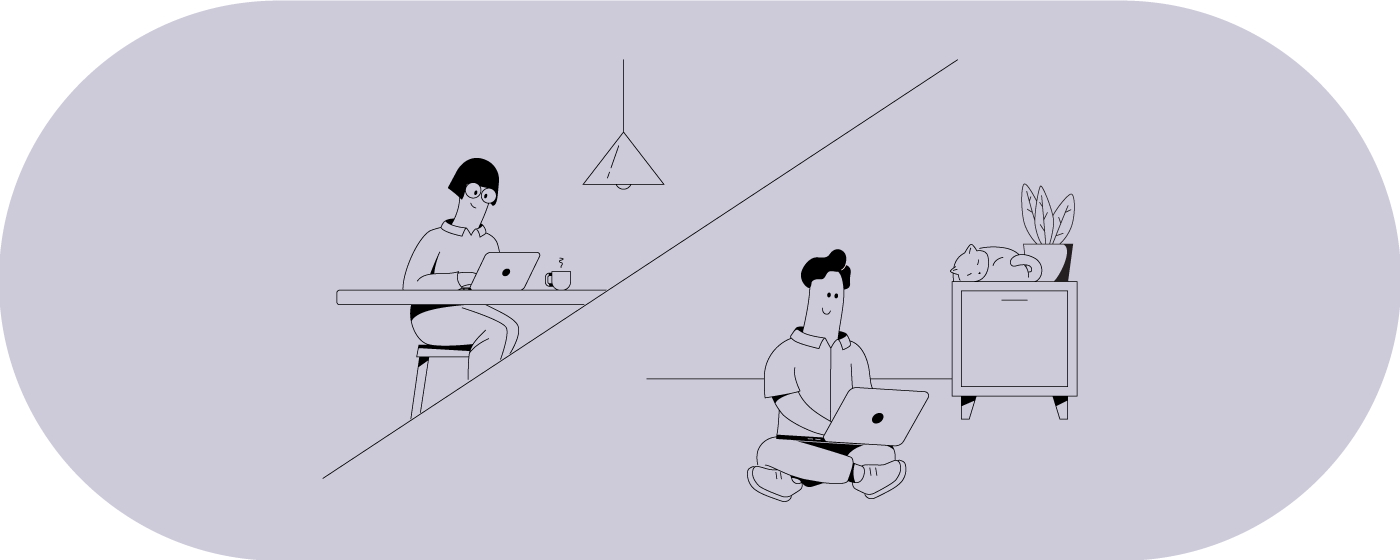The covid-19 pandemic has brought us numerous challenges and, among them, some new business trends. Remote working has been a hot topic for many companies worldwide, but now it's even more pronounced. We often tend to even out the terms work from home and remote working, and they aren't quite the same.
There is a difference between these two, and business owners often neglect that employees have business hours like everyone else when working from home or remotely.
Now, let's map out these differences and explain them more thoroughly!
Does working remotely mean working from home?
As pointed out earlier, these two terms are often used interchangeably while having different roles and obligations. For instance, working from home is applied to a short-term situation, while remote working requires a different approach and an ongoing process.
What is the difference between working from home and working remotely?
Working from home is similar to working in an office but choosing to change scenery throughout the week. There are various reasons people choose to work from home - you may want to avoid face-to-face meetings or just need a break from your coworkers. All you need is a work laptop, setting it up on your desk or a kitchen table, and you're ready to go.
Generally, this might be a significant change in your everyday routine, which can be pretty beneficial from time to time. Many employees state that working from home can be effective because it's different from the usual day-to-day. Working from home for more than a couple of days demands certain adjustments. You'll need to create a suitable workspace and set up clear boundaries between working and non-working hours. This might be the most challenging part!

Let's see what working remotely means. To explain in the simplest manner, remote working focuses on work outside the company's offices, and this is a permanent situation. The person who decides to work remotely needs to possess a different set of skills, resources, and abilities, starting with excellent time-management skills to a proactive attitude.
Additionally, remote working demands clear communication and a great deal of focus on the team's details since you aren't physically present and have to communicate through an online platform. On the other hand, you can create a working space according to your needs, and you aren't limited to space. You can design a home office in your manner.
Pros and Cons of Remote Work
Firstly, we'll take a look at the plus side of remote work.
Better productivity
It has come to our attention that people who work remotely might be more productive than their in-office counterparts. They are faced with fewer distractions and don't have to engage in meaningless conversation like they would in the office. Also, numerous remote positions allow you to work outside office hours. You choose the time of the day you believe you will be most productive, be that morning, afternoon, or night.
Improved work-life balance
Remote work implies you can spend more time with your family. Moreover, you can develop a perfect schedule that allows you to have an equal amount of time for your work and personal life. The lack of commuting ensures you have plenty of time to spend with your kids and spouse.
Healthier habits
Office workers have a hard time maintaining a healthy lifestyle, and many of them are obligated to skip healthy and balanced meals during the morning and afternoon. When you're working from home, there's no need to worry about such things. You can take a break anytime to prepare yourself a healthy and nutritious meal, exercise, and overall improve your healthy habits.
If you've concluded that remote work is a bed of roses, here are a couple of arguments to convince you otherwise.
Lack of communication
The lack of interaction could be one of the biggest cons of remote work. After all, people are social beings and require daily communication. When you are in the office, it's easy to approach your coworker and discuss something in person. On the contrary, as a remote worker, you're entirely reliant on online tools to talk to your team members.

Chat Etiquette Cheat Sheet
Motivation challenges
Without active supervision or coworkers working around you, it's harder to stay motivated and meet your goals. For managers, this has been one of the main concerns linked to remote work. An employee could quickly develop a laid-back attitude and procrastinate.
Management challenges
While working remotely sounds like fun and interesting, it can pose some management challenges. For instance, you will have to take care of your workstation, internet connection, and other work-related stuff. So, to answer what fully remote means: it involves learning and using different technologies, facilitating your work, and improving efficiency.
Pros and cons of working from home
Let's start with the good stuff.
Independence
When you're working from home, you can organize your working day the way it suits you. It means you don't have to check where your boss is or talk to your coworkers, which gives you more time to focus on tasks.
Save money
Since you aren't going to the office or getting ready for it, you can forget about fuel or clothes expenses. This can help you save a lot of money, and if you have small children, you don't have to pay for childcare either.
More job opportunities
When you are working remotely, you can have two or more jobs at once within related fields. Also, people with disabilities that have a hard time traveling long hours can build their careers remotely.
There's a dark side to everything, and working from home is no exception.
Isolation
Employees who love physical interaction and office environments may feel isolated when working from home. However, the key to feeling less isolated is to schedule frequent get-togethers with friends and family. Some companies even organize team events to boost socialization.
Risk of overworking
Some people don't separate office from personal hours, which leads to exhaustion and overworking. In this case, you have to be extra careful because overworking can cause work-related stress and burnout.
Distractions
When you are working from home, you are susceptible to many distractions. For example, you may want to check out what's happening on Facebook, watch TV or do some household chores. To avoid distractions, you can use noise-canceling headphones and play some relaxing music.
What do I need to work remotely from home?
This is where the home office definition gets its whole meaning. Here are a couple of suggestions you might find helpful of the essentials your home office should have.
- Phone line
- Internet connection
- Phone headset
- Webcam
- Transcription software
- Printer and scanner
- The latest version of software
- Desk and cabinets
- Ergonomic office chair
.png)


![Drawing the Line Between Work and Private Life [5 Time Management Tips]](https://activecollab.com/upload/blog/402/cover.png)
